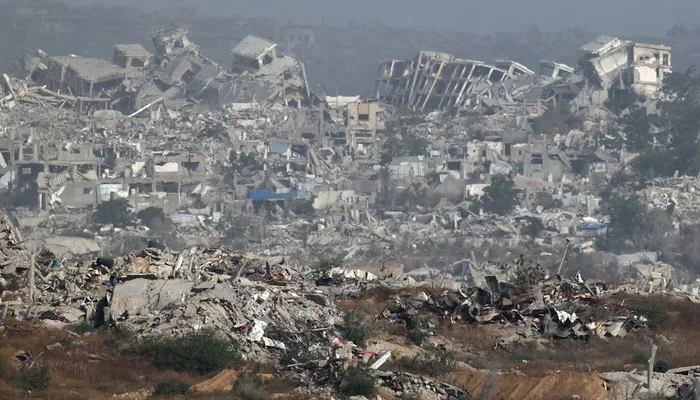Fate of Gaza Ceasefire Talks Hangs in the Balance Amid Ongoing Violence

DOHA/GAZA – Indirect ceasefire negotiations between Israel and Hamas are facing major hurdles in Doha, Qatar, with both sides locked in disagreement over the extent of Israeli withdrawal from the Gaza Strip. As talks stall, deadly Israeli attacks continue across Gaza and southern Lebanon, further deepening the humanitarian crisis and complicating peace efforts.
Disputes Over Israeli Withdrawal Lines Delay Progress
According to sources familiar with the talks, the primary obstacle lies in Israel’s proposed troop withdrawal maps, which Hamas has rejected outright. A Palestinian source told Reuters that the maps would leave 40% of Gaza under Israeli control, including large parts of Rafah in the south and northern and eastern Gaza, areas still heavily affected by ongoing military operations.
Hamas is demanding a full withdrawal to the positions held during the previous ceasefire, before Israel renewed its offensive in March. Two Israeli sources confirmed that Hamas seeks a rollback to the earlier lines as a condition to begin the first phase of the proposed 60-day ceasefire.
Despite the impasse, mediators said indirect talks will continue in Doha, with the United States, Qatar, and Egypt pressing both parties to reach an agreement before the situation deteriorates further.
Humanitarian Aid and Security Guarantees Pose Additional Challenges
Beyond the troop withdrawal dispute, negotiators are also grappling with issues related to aid distribution and international guarantees. A senior Palestinian negotiator said Hamas wants clear commitments on the delivery of humanitarian aid, as well as guarantees from mediators that Israel will not resume hostilities once the temporary ceasefire ends.
The issue of civilian access to food and medical relief remains especially urgent. Recent Israeli strikes have severely impacted aid operations in Rafah, killing dozens at the only active food distribution site run by the Global Humanitarian Foundation (GHF).
Negotiators fear that without clear aid delivery mechanisms in place, any short-term truce may fail to address the worsening humanitarian disaster, which has left Gaza’s population of over 2 million in critical need.
Israeli Airstrikes Kill Dozens as Talks Stall
While diplomats push for progress in Doha, Israeli forces continue their offensive across Gaza. Since early Friday, Israeli airstrikes have reportedly killed at least 60 Palestinians, including 27 civilians waiting for food aid, according to Gaza’s health authorities. Israeli jets have carried out over 250 strikes in the past 48 hours, targeting what the IDF claims are Hamas infrastructure, sniper posts, tunnels, and weapons caches.
In Deir al-Balah, 13 people, including four children and two women, were killed. In Khan Younis, 15 others died in separate air raids, while four more were killed near a fuel station, officials at Al-Aqsa and Nasser hospitals confirmed.
Meanwhile, in the occupied West Bank, two Palestinians — one of them reportedly a Palestinian American — were beaten and killed by Israeli settlers, raising further alarm over settler violence amid the ongoing war.
Aid Distribution Site in Rafah Attacked Again
The GHF’s last operating food distribution center in Rafah has come under renewed attack, leaving at least 30 people dead and over 130 wounded, according to Al Jazeera’s Hani Mahmoud, reporting from Gaza.
Eyewitnesses said Israeli forces opened fire indiscriminately on a large crowd, many of whom had traveled from the north in desperate search of food. “Many of the bodies are still lying on the ground,” Mahmoud reported, adding that the wounded were transported to Nasser Hospital in Khan Younis.
This site is the last remaining hub for aid distribution in Gaza since GHF shut down its Khan Younis center for maintenance. Aid groups warn that forcing millions of civilians to travel to a single aid point in a war zone is creating deadly bottlenecks, making ceasefire efforts even more urgent.
Regional Tensions Escalate with Strike in Southern Lebanon
As the war drags on, tensions are spilling over Gaza’s borders. On Saturday, an Israeli airstrike hit a house in the town of Khiam, southern Lebanon, killing at least one person, according to Lebanon’s Health Ministry. The Israeli army has yet to comment on the strike.
In a separate development, the Pentagon confirmed that an Iranian ballistic missile struck a US military communication dome during a June 23 attack on a base in Qatar, signaling a dangerous expansion of regional hostilities.
Follow us on Instagram, YouTube, Facebook,, X and TikTok for latest updates




